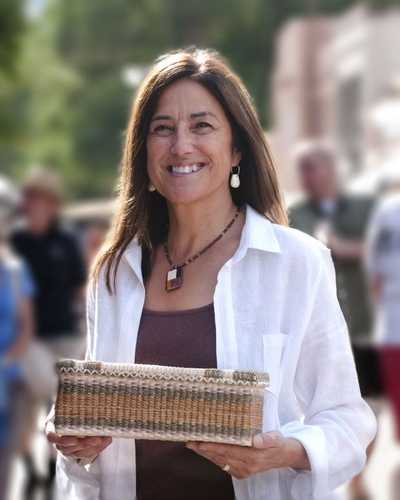Keywords: Penobscot Tribe
Item 10055
Penobscot Band Basket, ca. 1860
Contributed by: Hudson Museum, Univ. of Maine Date: circa 1860 Location: Maine Media: Black ash
Item 70074
Indian Island, Old Town, ca. 1935
Contributed by: Boston Public Library Date: circa 1935 Location: Old Town Media: Linen texture postcard
Exhibit
Land Claims, Economic Opportunities?
The landmark 1980 Maine Indian Land Claims Settlement Act provided $81.6 million to Maine Indians for economic development, land purchase and other purposes. The money and increased land holdings, however, have not solved economic and employment issues for Maine Indians.
Exhibit
Redact: Obscuring the Maine Constitution
In 2015, Maliseet Representative Henry Bear drew the Maine legislature’s attention to a historic redaction of the Maine Constitution. Through legislation drafted in February 1875, approved by voters in September 1875, and enacted on January 1, 1876, the Sections 1, 2, and 5 of Article X (ten) of the Maine Constitution ceased to be printed. Since 1876, these sections are redacted from the document. Although they are obscured, they retain their validity.
Site Page
Lincoln, Maine - The Stanislaus Family
"Stephen probably made changes to the Penobscot people and to people in the area to ensure a better life style for them while he served his eight year…"
Site Page
"The steamboat was owned by the Penobscot Navigation Company. William Moor and his brother Daniel Moor Jr. navigated the first steamboat."
Story
Restoring the Penobscot River
by John Banks
My role as the Director of the Department of Natural Resources for the Penobscot Indian Nation
Story
Decontie and Brown's venture in high fashion design
by Decontie and Brown
Penobscot haute couture designs from Bangor
Lesson Plan
Nation to Nation: Treaties and Legislation between the Wabanaki Nations and the State of Maine
Grade Level: 9-12
Content Area: Social Studies
This lesson plan asks high school students to think critically about and look closely at documentation regarding the Nation-to-Nation relationship between the Wabanaki Tribes/Nations and the State of Maine. This lesson asks students to participate in discussions about morality and legislative actions over time. Students will gain experience examining and responding to primary and secondary sources by taking a close look at documents relating to the Maine Indian Claims Settlement Act of 1980 (MICSA) and the issues that preceded and have followed the Act.
Lesson Plan
Wabanaki Studies: Stewarding Natural Resources
Grade Level: 3-5
Content Area: Science & Engineering, Social Studies
This lesson plan will introduce elementary-grade students to the concepts and importance of Traditional Ecological Knowledge (TEK) and Indigenous Knowledge (IK), taught and understood through oral history to generations of Wabanaki people. Students will engage in discussions about how humans can be stewards of the local ecosystem, and how non-Native Maine citizens can listen to, learn from, and amplify the voices of Wabanaki neighbors to assist in the future of a sustainable environment. Students will learn about Wabanaki artists, teachers, and leaders from the past and present to help contextualize the concepts and ideas in this lesson, and learn about how Wabanaki youth are carrying tradition forward into the future.














